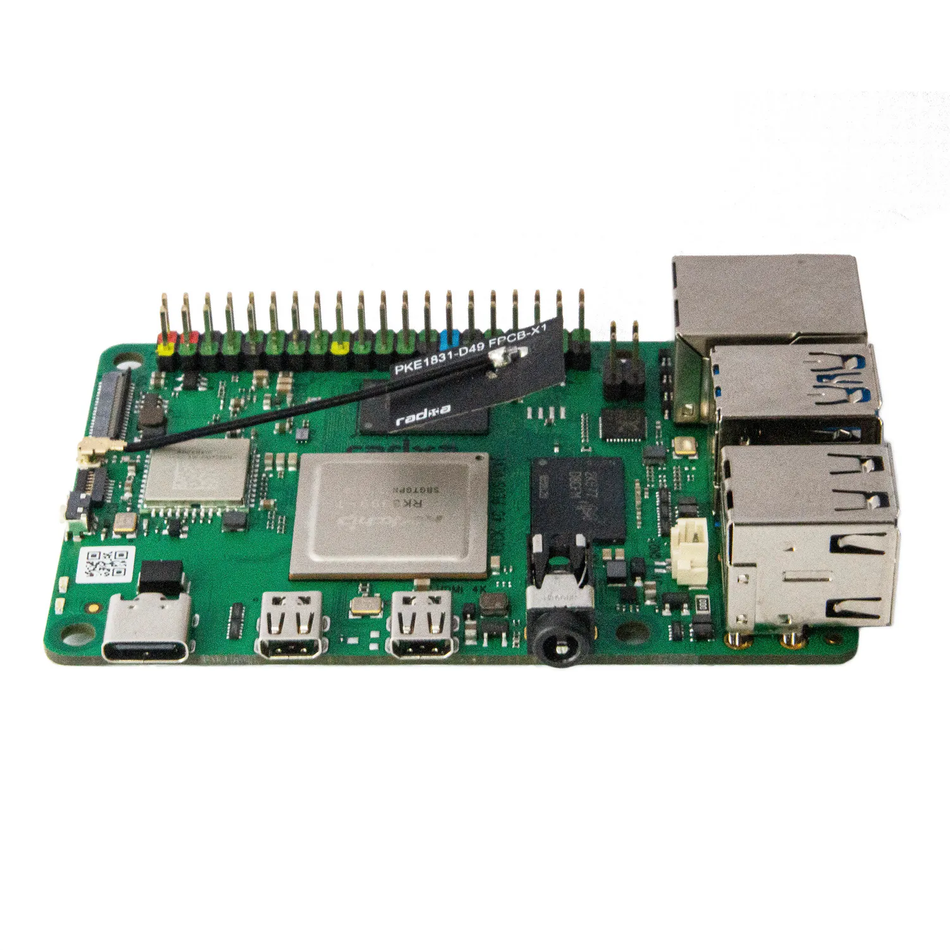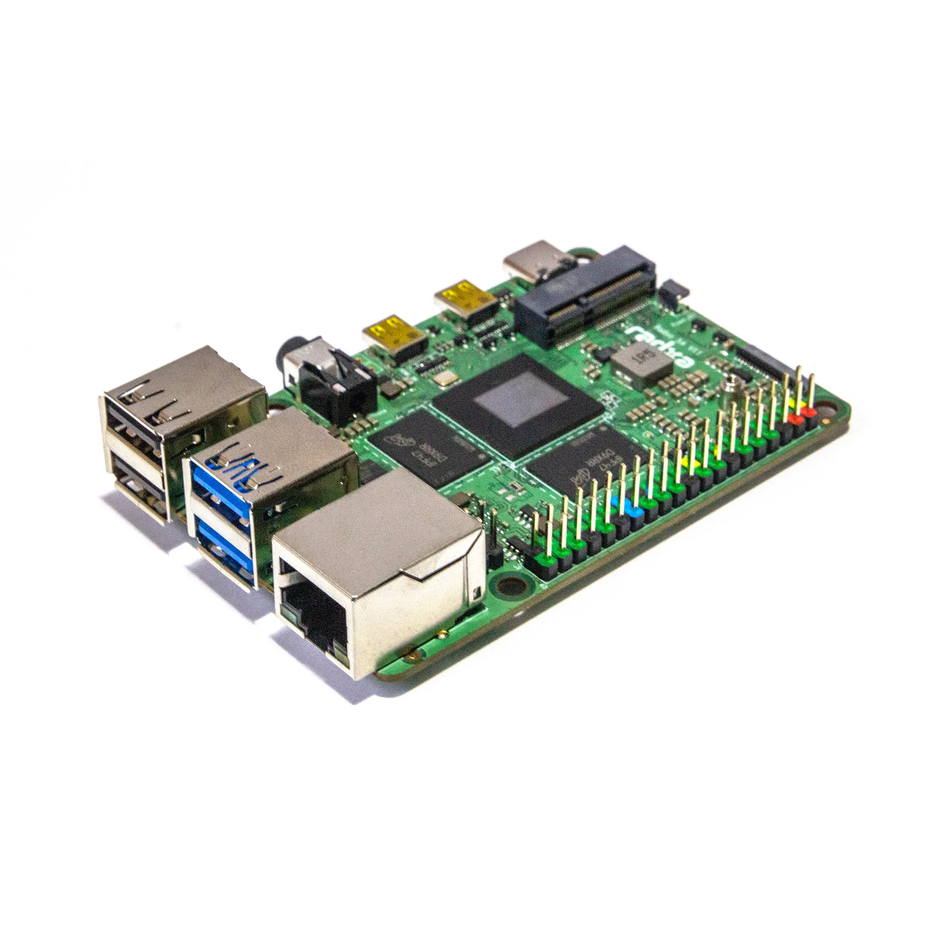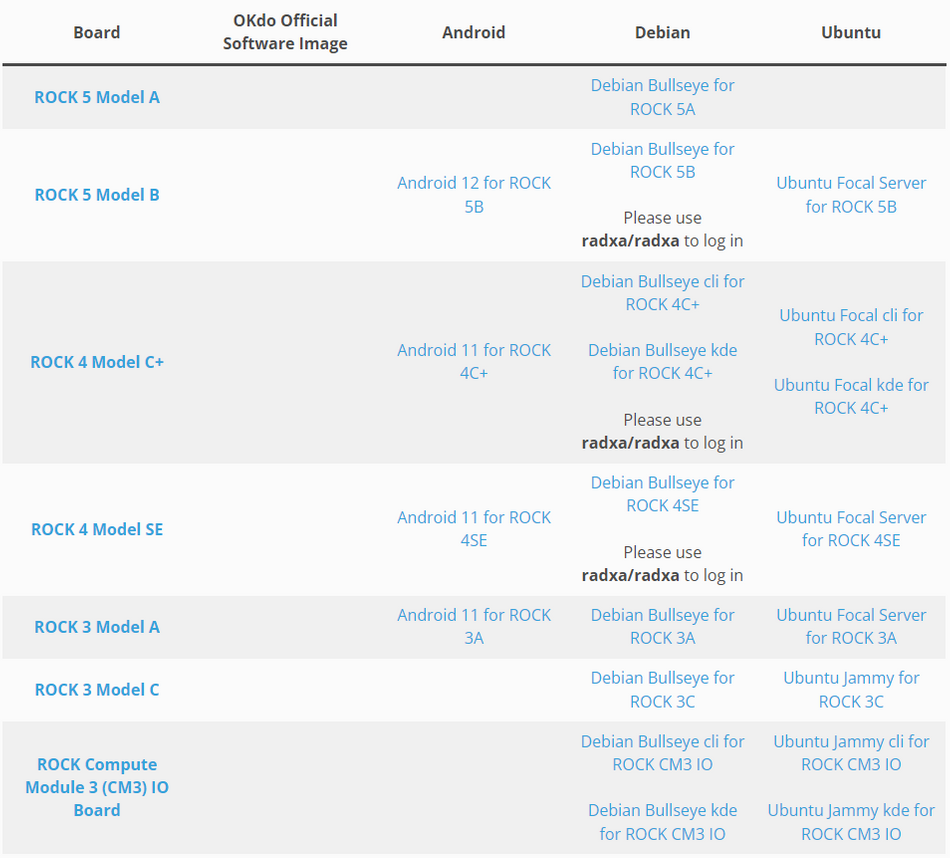Navigating the Software Landscape of Cutting Edge SBCs
Learn how SBCs take advantage of the different operating systems and ensure stability and robustness in different applications
Single board computers (SBCs) are complete computers built on a single circuit board, with a microprocessor, memory, input/output, and other features required of a functional computer. SBCs are small, high-performance, adaptable, and easy to program, making them easy to incorporate into projects. Moreover, these devices offer a scenario of operational systems variety for developers to explore. The SBC compatibility with several operating systems enables versatility and a wide range of applications in different fields.
In this context, the SBCs, such as the ROCK Series developed by OKdo in collaboration with Radxa, have the capacity and compatibility to operate with different operational systems. This article delves into the software ecosystem of ROCK, exploring operating systems, their advantages, and how these devices attend to developers in the constantly evolving technological landscape. Furthermore, it also explores the integration of AI capabilities into SBCs and how this offers advantages for innovative applications.
Exploring OS Diversity on ROCK SBCs
ROCK SBCs support various operating systems (OS), enabling developers to choose the platform that best suits their project requirements. The supported operating systems include Android, Debian, and Ubuntu.
Android in ROCK SBCs
Android is an open-source operating system developed by Google and primarily used in smartphones and tablets. However, it can also be used in SBCs. To successfully integrate Android into SBCs, it is essential to meet the hardware requirements, obtain the appropriate drivers, and choose the right system images. With these elements in place, Android can be an excellent choice for many projects, especially those aimed at entertainment and interactivity.
In SBCs, such as ROCK, the Android has good performance because this SBC has an ARM processor architecture that supports this system. The advantages of opting for Android on SBC ROCK include a user-friendly interface, support for Android apps from the Google Play Store, and its suitability for entertainment and multimedia apps. Therefore, the developers can use various pre-built applications and libraries.
An example of an application using the ROCK with the Android system is that it is possible to build a low-cost digital signage project, occupying a small space and still consuming little energy, being able to be powered from an electric socket or by battery. The ROCK 4 C+ can be used in this application, as it has an Arm Mali T860MP4 graphics processing unit (GPU) and has two micro HDMI ports with support for dual monitors with a resolution of up to 2Kp60 and 4Kp60. In addition, ROCK 4 C+ has high-quality stereo audio output and support for Android 7.1/Android 5.0/Android 10/Android 11.
If you want to use Android on the ROCK series, OKdo has provided a step-by-step guide to help you get started. The ROCK 3A and the ROCK 4C+ are compatible with Android 11, while the ROCK 5B is already compatible with Android 12. The guide provides a step-by-step process to get you started quickly and easily.
Debian/Ubuntu Linux
Debian and Ubuntu are general-purpose Linux operating systems widely compatible with various SBCs, such as the ROCK Series, and offer high flexibility. Linux systems have a community that provides extensive support, including forums, documentation, and repositories with a wide selection of software packages. Therefore, developers can find answers to technical challenges and receive continuous support.
Debian/Ubuntu Linux are attractive application options, from servers and software development to machine learning projects. They offer access to various packages and development tools, making them a solid choice for diverse projects.
The ROCK 5A is a single-board computer fully supporting the Arm architecture v8 instructions for Debian/Ubuntu Linux. It is compatible with 64-bit Linux distributions and comes with official support for Debian and Ubuntu servers and third-party images like Armbian. The latest version of the ROCK 5A runs on kernel 5.10.
Suppose you're looking to get started with the ROCK 5A. In that case, OKdo provides a guide showing you how to install Debian Bullseye on an SD card, allowing you to run a highly functional and sophisticated KDE desktop environment for general SBC use. Once your system is up and running, you can choose from thousands of free, open-source applications to add to your system.
Maximizing OS Versatility for Varied Applications
The software flexibility of ROCK SBCs extends to a wide range of applications, offering versatility in projects. IoT and AI applications are among the main applications for these SBCs, where ROCK offers high processing power at low cost.
IoT applications
ROCK offers a hardware architecture containing the technical requirements for IoT applications, such as high-performance and robust hardware, different connectivity options, and ample storage capacity. These SBCs come equipped with Wi-Fi and Bluetooth modules, guaranteeing wireless connectivity for IoT devices. Furthermore, GPIO headers and support for I2C and SPI interfaces enable the connection of various sensors and actuators.
Thanks to their hardware requirements and software compatibility, IoT applications such as smart homes and industrial automation can be realized using ROCK SBCs. This is possible at a low cost and low power consumption while still achieving high performance despite the SBC's small form factor.
AI applications
In the context of AI, a technical aspect present in the ROCK 5A that allows for advanced AI applications is the neural processing unit (NPU) present in this SBC. The NPU is a dedicated hardware component designed to accelerate AI-related calculations. The RKNPU2 NPU software stack in the ROCK 5A enables efficient AI inference tasks, supporting high performance and compatibility with AI frameworks such as TensorFlow and Caffe.
In contrast, while the ROCK 5A takes advantage of an NPU for AI acceleration, other SBCs, such as the ROCK 4 SE and ROCK 4 C+, have GPU-enabled AI stacks. These GPUs, while less specialized than NPUs, still offer significant processing power for AI workloads. This diversity in AI hardware accelerators allows developers to choose an SBC that aligns with the specific requirements of their project. For example, GPU-enabled AI stacks can be suitable for more general-purpose AI tasks, providing flexibility in the choice of hardware.
Integrating AI hardware acceleration into SBCs like the ROCK 5A ensures that AI operations run smoothly and efficiently. This is particularly important for edge computing applications, where real-time or near real-time processing is required. The efficiency achieved through specialized NPUs or GPUs translates into lower power consumption, making these SBCs options for battery-powered AI projects or those with limited resources.
AI capabilities, be it through NPUs or GPUs, in SBCs such as the ROCK 5A, ROCK 4 SE, and ROCK 4 C+ allow its use in different applications involving, for example, image recognition, voice processing, and machine learning. Image recognition, for example, can be used in security systems, robotics, and even automated quality control in manufacturing. Voice processing is used for voice assistants and human-machine interaction. Machine learning in SBCs can be used, for example, in data analysis and predictive maintenance. As a result, the versatility of these SBCs in supporting these applications makes them a choice for AI enthusiasts and developers.
Therefore, the use of NPU and hardware acceleration in ROCK SBCs increases the capabilities of these compact computing platforms, making it possible to harness the power of artificial intelligence in applications that benefit from efficiency, compactness, and versatility. Furthermore, these SBCs bring low cost and power consumption to applications while maintaining high performance.
Security, Stability, and Software Patches in ROCK SBCs
Maintaining a secure and reliable computing environment is crucial for system performance and data security, and keeping your software current is essential. Regular software updates and security patches are necessary to ensure that SBCs run optimally. ROCK SBCs attend this and frequently release updates to address vulnerabilities and improve security. These updates are designed to strengthen the system against known threats, providing better protection for data and applications.
Additionally, ROCK SBCs are designed to provide users with stability and reliability in hardware and software. Their software ecosystem is carefully selected to ensure compatibility and stability. Whether using a Linux distribution like Ubuntu or Debian or a specialized system like Armbian, you can rely on a consistent software environment that minimizes compatibility issues and maximizes performance. For example, stability is crucial in applications such as industrial automation or critical data processing, and downtime is unfeasible.
As well as security and stability, software updates also contribute to performance improvements. Software developers work on optimizing the code and introducing new features, and regular software updates ensure the SBC runs efficiently. Newer kernels, drivers, and libraries are integrated into the software stack, improving compatibility and allowing the ROCK SBC to use the latest hardware advances. Therefore, as the hardware evolves, the software must keep pace.
Conclusion
The software landscape of ROCK SBCs is not only diverse but also technically solid. Developers have the flexibility to choose the OS that best suits their project's technical requirements, and they can harness the full potential of IoT and AI capabilities for innovative applications. With ongoing software support focusing on stability and security, ROCK SBCs provide a robust foundation for projects in the constantly evolving world of technology.
References
OKdo. “ROCK Single Board Computers”
Teresa Reidt, 2023. “Radxa ROCK 4SE: Compared with Raspberry Pi 4B and other ROCK 4 models”
Electronics Media, 2023. “OKdo & RS Launced Next-Generation ROCK 5A Single Board Computer”
Teresa Reidt, 2022. “ROCK Pi Android: Run Android on ROCK Pi 4”
Utmel Electronic, 2021. “Neural Processing Unit (NPU) Explained”




